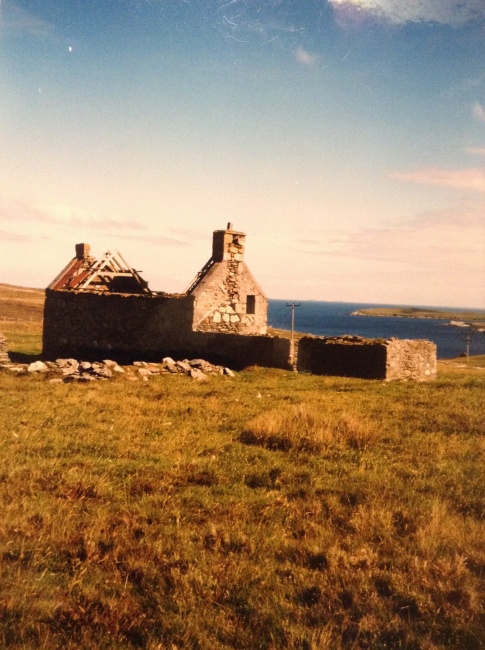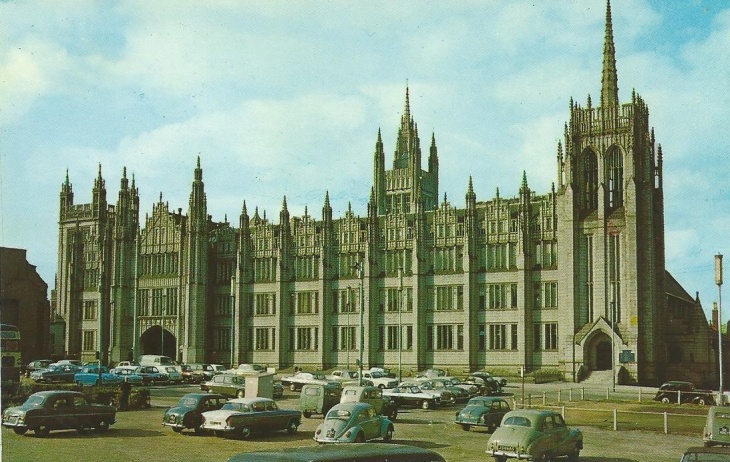
In our latest alumni update Angela Kiossoglou-Adams tells us what it was like studying in Marischal College in the 1960s and where life has taken her since graduating
In 1963 I moved from a small cancer research laboratory in NZ to a post in a EURATOM radiation research institute in Germany. From there, feeling poorly qualified, with a mere 3-year BSc degree, compared to my German colleagues' impressive educational backgrounds, I came to Aberdeen to work towards a PhD, under the supervision of the renowned radiation geneticist, Prof. John Evans.
I had imagined Aberdeen would be a kind of homecoming: after my years in Germany, it seemed similar to my Scottish-founded hometown, Dunedin, with it's grey stone buildings and damp climate. However, I was definitely a foreigner: the local students stuck together and I formed my close friendships with colleagues from Poland, Pakistan, Spain, England and Switzerland, though kindly local academics also took me under their wing.
The brand-new genetics building I was to move into had collapsed (with sad loss of life) before I arrived, so space had to be found for me in the crowded lab at Marischal College of Don Fox and then of Bill Watson, both of whom had little enough space for themselves and their technicians. I was also a regular visitor to the radiation facilities at Foresterhill, where the technicians graciously slotted my cell cultures into what must have been a busy daily schedule.
Marischal College itself was quite an experience: The Genetics Department straddled three floors: moving equipment from the mezzanine to the basement or to the first floor meant changing the plugs each time to fit one of the three different kinds of sockets on each floor. There were also problems with theft of equipment; the lad who had stolen 'my' valuable microscope-camera, which was found at a Newcastle pawnbroker's (if I remember correctly), told the police how terribly easy it was to enter the building without raising suspicion.

The centre of my then world: Marischal College - Although this photo is much
older than I am, it shows Marischal College dominating the city
It wasn't easy being an older student (I was 26 - which felt old - and most of my fellow PhD students were in their early 20s and seemed so young) and I often struggled to hold my own as a woman in scientific research, in spite of Prof. Evans' very open approach to women in science and towards me. I battled on, taking special pleasure in my more intricate experiments, which required careful timing and detailed microscope work, while images of chromosome spreads invaded my sleep every night. I finally completed my projects, wrote up the results, submitted the thesis and was ready to move on.
Although I was to take up a post-graduate research position in a Sydney CSIRO Institute, I backed out at the last minute, choosing to settle in Greece with a fellow cytologist (haematologist and paediatrician) whom I had met in Boston, 7 years previously - during a stopover in the US on my way by sea from NZ to Europe - and again while I was in Germany. It must seem inexcusable that all that training and education was thrown to the winds but, looking back, my decision to back out of a serious commitment (into another) was - not to undermine my relationship with my husband - partly due to my feeling out of my depth and to a possible reluctance to leave Europe for Down Under.
In Athens, I was too specialised to find work in my field and without the appropriate contacts, any kind of position was unlikely to arise. It wasn't until my children were older and my time freed up that I found work at a prestigious Greek private school where I carried out projects for the US president of the school: on the school archives, doing research of a kind, translating and interpreting between Greek and English. I later taught science related subjects at the local branch of a small US university here, though it took me months of reading to bring myself up to date on molecular biology to be able teach the Developmental Biology course.
The interim years were not idle: with a group of friends we set up a 'Cross-Cultural Association' where we held events designed to help people coping with living in a different culture. All kinds of issues arose, such as how to give children a positive experience of both (or all) of their cultures and languages; understanding the difficulties arising in a cross-cultural relationship; dealing with the bureaucracy here; finding work. Together with a very active multicultural feminist group (this was the mid-late 70s), out of which the Cross-Cultural Association had grown, discussions were held, smaller groups met, newsletters were issued and firm friendships made.
My one regret about my time in Aberdeen is that I never visited my ancestral home of Shetland, mostly because I knew so little about my family there. I have since visited the island of Yell and met my 'cousins', local descendants of the same great great grandfather, a parochial schoolmaster tin East Yell in the 1800s; his schoolhouse, recently demolished, is pictured here:

Now, in retirement, I am involved in a project run by an academic in Boston, which draws on the copious correspondence of this man, for a book designed to give a rich picture of Shetland life in the mid-1800s.
********
Aberdeen University, with King's College, especially, inspiring awe for its quiet beauty and for what it must have witnessed over the centuries (Marischal College now excluded from university life); the hospitable old cottages lining College Bounds; Aberdeen itself, with its lively fish market, the grey of its buildings and green of its parks; the sea pounding the beach and the rocks; and the exquisite countryside, especially in spring time, where that soft luminosity brings everything into clear focus, from the most delicate flower to the most distant hill: all these lie deep in my heart.

Marischal College in the 1960s


